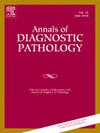Poor response of HER2-positive mucinous carcinomas of breast to neoadjuvant HER2-targeted therapy: A study of four cases
IF 1.5
4区 医学
Q3 PATHOLOGY
引用次数: 0
Abstract
Background
Breast mucinous carcinoma (MC) is typically positive for estrogen receptor (ER) and progesterone receptor (PR) expressions and negative for human epidermal growth factor receptor (HER2) overexpression. HER2 positive MC is a rare entity; its response to neoadjuvant HER2-targeted therapy remains unclear.
Methods
Four cases of HER2 positive MC and seven cases of HER2 positive invasive ductal carcinoma with mucinous features (MCF) were identified. Clinicopathologic features were collected. Patients' germline data was gathered if available. Tumor's response to HER2-directed treatment were recorded and compared.
Results
Two HER2 positive MCs were treated with neoadjuvant HER2-directed treatment and showed no response in the subsequent surgical resection specimens including one positive lymph node showing no treatment effect. One patient had upfront surgery. The fourth patient presented with advanced stage and showed progression on HER2-directed treatment. Six HER2 positive MCFs received neoadjuvant HER2-directed therapy; two cases showed complete pathologic response and four had only minimal residual carcinomas in the breast. Two cases with positive lymph nodes had complete response in the lymph nodes. The seventh patient presented at an advanced stage and was stable on HER2-directed treatment.
Conclusions
Our findings suggest that HER2 positive MCs may be resistant to HER2-directed treatment. This is in contrast with the excellent treatment response observed in HER2 positive MCFs. It is important to report mucinous carcinoma percentage in biopsies on HER2 positive tumors as it may be related to treatment response. Further investigation of the underlying mechanisms may help optimize clinical management in this patient population.
HER2阳性乳腺黏液癌对新辅助HER2靶向治疗反应不佳:四例病例研究。
背景:乳腺粘液癌(MC)通常雌激素受体(ER)和孕激素受体(PR)表达阳性,而人类表皮生长因子受体(HER2)过度表达阴性。HER2阳性MC很少见,其对新辅助HER2靶向治疗的反应尚不明确:方法:确定了 4 例 HER2 阳性 MC 和 7 例 HER2 阳性伴粘液性特征的浸润性导管癌(MCF)。收集临床病理特征。收集患者的种系数据(如果有的话)。记录并比较肿瘤对HER2导向治疗的反应:结果:2 例 HER2 阳性 MC 接受了新辅助 HER2 靶向治疗,但在随后的手术切除标本中未显示任何反应,其中 1 例淋巴结阳性未显示治疗效果。一名患者接受了前期手术。第四例患者为晚期,接受 HER2 导向治疗后病情出现进展。6 例 HER2 阳性 MCF 接受了新辅助 HER2 导向治疗;其中 2 例病理反应完全,4 例仅在乳房内有极小的残留癌。两例淋巴结阳性患者的淋巴结完全反应。第 7 例患者为晚期,接受 HER2 导向治疗后病情稳定:我们的研究结果表明,HER2 阳性 MCs 可能对 HER2 导向治疗产生耐药性。结论:我们的研究结果表明,HER2阳性MC可能会对HER2导向治疗产生耐药性,这与在HER2阳性MCF中观察到的良好治疗反应形成了鲜明对比。报告HER2阳性肿瘤活检中的粘液癌比例非常重要,因为这可能与治疗反应有关。对潜在机制的进一步研究可能有助于优化这类患者的临床管理。
本文章由计算机程序翻译,如有差异,请以英文原文为准。
求助全文
约1分钟内获得全文
求助全文
来源期刊
CiteScore
3.90
自引率
5.00%
发文量
149
审稿时长
26 days
期刊介绍:
A peer-reviewed journal devoted to the publication of articles dealing with traditional morphologic studies using standard diagnostic techniques and stressing clinicopathological correlations and scientific observation of relevance to the daily practice of pathology. Special features include pathologic-radiologic correlations and pathologic-cytologic correlations.

 求助内容:
求助内容: 应助结果提醒方式:
应助结果提醒方式:


